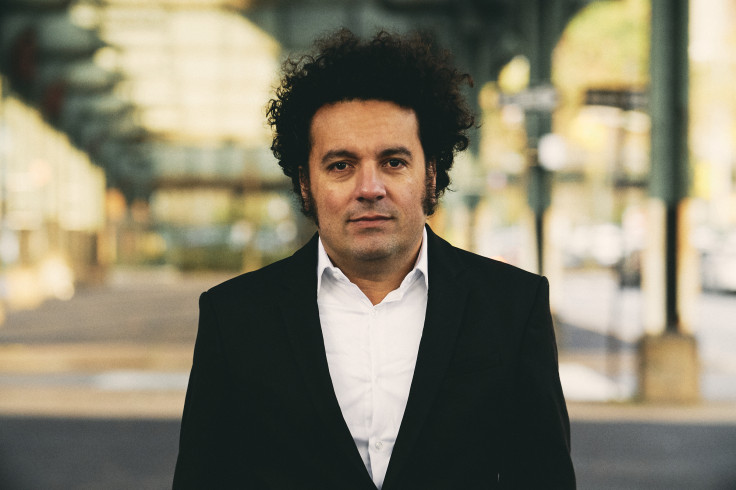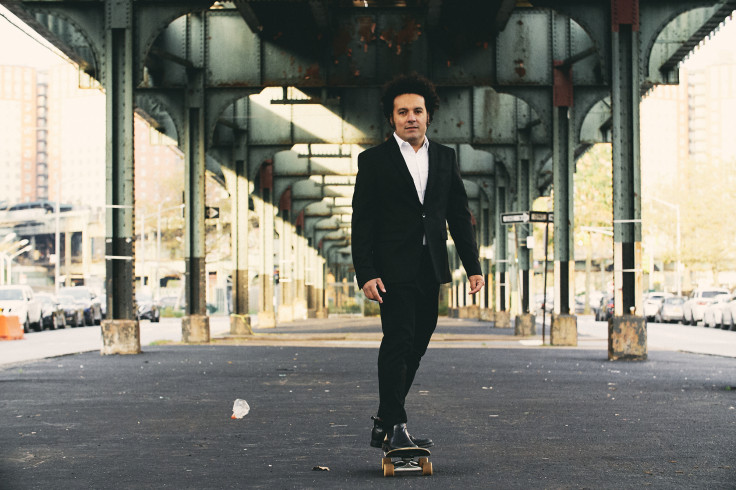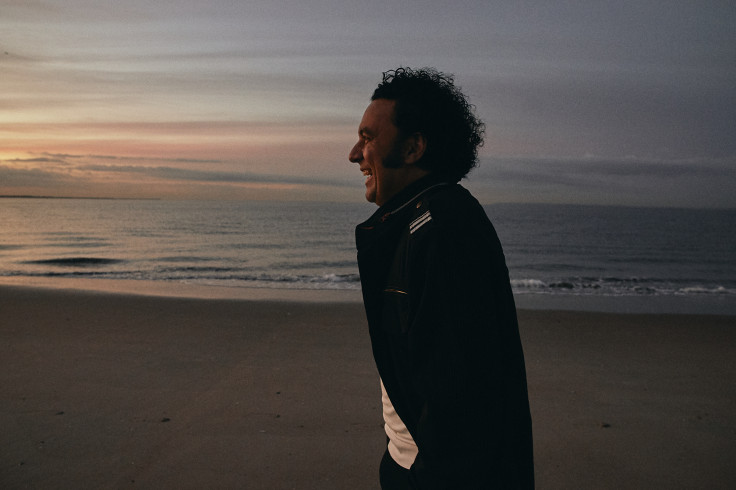
To most, he was the guitarist, the sound, the soul of Los Amigos Invisibles, arguably the most internationally renowned Venezuelan band in history. To others, he's Afro, the popular DJ that mixes everything from Disco to House to Cumbia. He's also a three-time nominated Grammy producer, a solo artist with two albums to his credit, a music historian who's helping to rescue the Venezuelan songbook of yore and the man who made quarantine weekends breezier for thousands of music lovers thanks to his Instagram Lives.
He's José Luis Pardo, AKA DJ Afro, AKA Cheo. And if all those hats weren't enough, he's now taking over Wednesday nights in the Big Apple to the tune of Salsa music.
After countless parties, musical collabs and God knows how many guitar riffs, you would think the 51-year old Venezuelan would be looking to take it easier and wind down. But at this stage in his life, he's busier than ever, enjoying the fruits of his multi-faceted career. "You kind of get to an age in which you're very comfortable with every facet of who you are" he explains. "I used to believe in alter egos, people would see me playing guitar and have no idea that I DJed and vice versa. But now I'm happy mixing it all up, going to a party and bringing everything I've got. It's a weird mix that somehow works."
He doesn't say a weird mix, of course. He says arroz con mango, a Venezuela expression that refers to something chaotic that doesn't seem to make sense. Nor does he say enjoy, he says vacilar; he says tocar apretao to refer to playing close together, chamba when referring to work, etc. He's as Venezuelan as they come and he's made New York his home for the better part of 20 years.
We sat down with Cheo to discuss his creative process, the value of collaboration and the impact of Latin music in the U.S. today.

So, let's start by talking about Wednesday nights at Nublu...
Well, I 've been playing for many years at Nublu, since 2006. It's like this temple for musicians and I've played a lot of House and Disco music through the years. Something curious happens to me in New York, which is that I have my cumbia side, my cumbia audience, my cumbia people. Then I have my disco crowd, which is a bit of what I inherited from Los Amigos Invisibles. And I also have my salsa side, which I play at salsa venues. But none of the audiences really mix.
But once I started my Cheo project (solo albums) I started joking with the people at Nublu that I was going to bring Cheo there for a session. Cheo is a lot of salsa. It has some disco, but it has a lot of Latin rhythms too. When they heard that, they asked me if I wanted to play one night a week, sort of like a Latin music party. So we continued to play around with that and I decided to put together a small orchestra called Los Consentidos de la Casa. And then we started playing and inviting guests on stage every night. And then it became like a big thing. It became like a vortex were people go to jam.
It's a different experience because it's always the same musicians so you start striving for a level of perfection. It's like a Broadway show where you polish the same thing over and over and over again. And at some point it sounds amazing.
What's it like performing in the most famous city in the world? Is it overwhelming, inspiring?
Well, the great thing is you have access to so many cultures. Let's say I want to create a merengue. In one day I can have four Dominican musicians in my studio. You want to make African music and you have the guy that's played those instruments all his life. Very few cities have that, with that quality of musicians. But New York has its pros and cons. The downside is that no one really commits to anything because everyone is playing with everyone. Everyone is playing in five bands waiting to see which one will take off. I always say that New York is the city with the best musicians in the world and the worst bands. Because bands don't have time to rehearse. So now that I have a band with which I can rehearse in New York I feel very fortunate.
So you're going back to the group format, something you've been constantly going back to now and then after splitting with Los Amigos Invisibles back in 2004. Why do you think you're pulled back into that collective format?
Well, I believe that the idea of doing something alone versus doing it as a team speaks for itself, doesn't it? When you work with a lot of people, stuff comes out faster and when people are focused on the same goal it comes out stronger. I mean, if you tell a band that everyone is wearing a suit and everyone dresses up and everyone jumps at the same time, it sounds and looks much better than if it's done all by yourself in a computer. Which is how I spent most years after Los Amigos: in front of the computer doing everything myself and hiring people. At some point you miss the collectivity, you miss the camaraderie.
Switching to the audience side of things, how receptive are people in New York to Salsa music and Latin music nowadays?
I believe that Latinidad is experiencing a wonderful moment. I think the fact that stuff like Bad Bunny being the most listened to artist on the planet brings with it a kind of familiarity towards the idea that Latinos can also do cool things. Not just from Latino audiences, but from the average American. They're more open-minded, they respect Latin culture as much as their own. That wasn't the case before. Now, people feel a sexiness that comes from something that has a Latin vibe to it. So we're enjoying that.
I also think we're being seen for the right reasons, through social media, diversity initiatives.. It's like an invasion, like we have them surrounded, in a way. So I think it's fun, because people see it all the time, people feel that sympathy for Latin American culture. I think we're in a great moment right now with Latin culture.
One thing I've been trying to do as a producer is to invite Anglo singers I know to sing Latin music. Just like Dean Martin made a Latin album or even Nat King Cole. It used to be that they did that to conquer Latin America, now it's to conquer Latin Americans who live here. It's not easy. We have Latin music in our blood but in their cases they usually try to play it or sing it, fail at it and discover a new respect for it.
But what do you have to do to conquer the locals? I mean, in your particular case in Nublu, how do you keep it from being something that's exclusively for the Latino community?
Well, you have to invite them. For example, there's one thing that we've been trying out as a sort of lubricant at salsa parties. When we started the parties we realized that only Latinos were coming. So we added a dance teacher who has many American students. So it suddenly became like a date night where people would hit the town as a couple to learn to dance salsa for an hour and then enjoy a live band. So you have to look for those lubricants and invite the locals, be welcoming.
How do you approach the creative process a this stage in your life? Has that changed at all?
I used to be a real control freak, I wanted everything to be perfect. With time, I've learned that as an artist I can't be on top of everything and part of the job is finding people you trust. If I involve you, then I have to make my peace with what you're bringing to the table. And that has it's magic too. The worst thing that could happen is that it doesn't work out (laughs).
That seems like a motto a lot of people in the industry would be very scared of
I know. I produce many musicians that have that fear. But, when you look at it there are so many factors. The music per se is just one of them. Suddenly, on the same day you release an album, Madonna releases an album, and it messes you up. All you can really do is keep doing, keep doing, and keep doing.
I can understand that, sure. But at the same time, you're allowed to take more risks because you've already had several projects that have been successful. How do you give that advice to an up-and-coming artist your producing?
I get that but I'll give you an example. I went to see a Picasso exhibition some time ago and when you see his early drawings and compare them to what he did later on you see that there's this really long journey. It's an evolution and I truly believe in that process, in what happens when you're constantly creating. And I feel when an artist thinks "this will be my masterpiece, it has to be perfect, not a single detail can be off", that sometimes ends up leading to disappointment.
I think the artist is his own worst enemy at times, when he overthinks, it's too much, he or she misses the moment when it's ready. I remember I was once in a recording session with a female artist that sang a song alone with her accordion. The producer added drums, bass, piano, and then called me up to add guitar. But in the end it wasn't sounding right. So we started muting every instrument we'd added. And the song ended up being just vocals and accordion.
So as a producer you have to also manage an artist's ego, their self esteem
Yep, I'm like a therapist.
You've been a student of music all your life, not just with how you make music but how you study music history in general. You've even worked on rescuing Venezuelan music, re-recording songs that had been lost, for example. Do you feel a commitment to showing the newer generations where stuff comes from?
To be honest, I feel I'm very fortunate because both older and younger people answer my messages. I'm in the middle of both, I'm like a bridge. There's this generational gap between them. And I feel that when I started doing music a lot of people would come to me and say "that thing you're trying to do, it's already been done". I was very arrogant back then and I'd ignore them. And now I find myself being the one saying that exact line to younger artists (laughs). I find myself saying: "listen so you can learn. I'm not discrediting your talent at all, it's just understanding how it's been done."
But something curious is I also find myself talking to older people that say "they don't make music like they used to". And I love to show those people that there are people doing incredible funk, incredible jazz. The best music hasn't necessarily all been written already.

© 2025 Latin Times. All rights reserved. Do not reproduce without permission.





